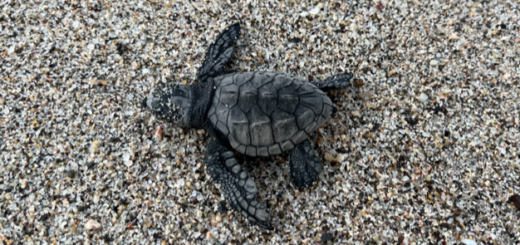Second Reason: Our Space And Pace In The Age Of Social Media
Turtle(s)Pace

I made myself a promise that all my blogs will be guided by the thought of that young sea turtle, Chai. As you may have noticed by now, the general title of this blog site Turtle(s)Pace contains the words space and pace.
Our Space
The continued acceleration of the power of technology has brought humanity closer together than in any moment of our history, albeit virtually. New social media apps keep popping up even before we can master the existing ones. Our interpersonal space has become so small that we are able to be with each other in real time anywhere in the world. We can livestream each other 24/7.
Our Pace
With our virtual proximity so close, the pace of our daily life has also become faster than ever before. Preparing for bed we first make sure that we get the latest happening anywhere in the world. Lest we get behind what is trending. And the first thing we do when waking up in the morning is grab our gadgets to make sure we get the most recent events we missed during our slumber. There is a feeling that our time measured in hours is no longer enough. We want to remain connected to the world uninterrupted. Our interest and curiosity with all the happenings in the world and other peoples’ lives make our modern life more and more exciting. We cannot thank technology enough.
Space-Time: what we do within affects us all

The relationship of space and time has fascinated great scientists, philosophers, and mathematicians for many years. Space-time, some say, is a single concept that describes our physical world we inhabit and the events we create within it, or something like that. However, we mere mortals do not need to understand this complicated relationship, we are experiencing it in the here and now.
Speeding in a narrow space
However, occupying a space that gets smaller and smaller because of technology can also have a devastating effect on our lives. It becomes too close for our comfort. And we are very much capable of expressing this discomfort at lightning speed. Any tweet we disagree on, any Instagram post we dislike, anything coming from someone we see online we deem offensive to our own sensibility; we can be brutal in expressing our unease. I used to live in the Bay Area in California where most big tech companies were born. And driving by their headquarters was just a normal routine for me. I was always curious what went on inside those buildings. I was oblivious to the future reality that simple ideas and experiments being cooked behind those walls would create a seismic shift in the lives of people around the globe.
Mark Zuckerberg
When Zuckerberg et.al. first brought their idea to Palo Alto in 2004 they sold that idea to the world as something that would bring humanity closer together. It was just about exchanging nice messages and tagging cute pictures with each other. Zuckerberg promised that the core of the platform would be based on transparency and honesty. Meaning, there was accountability in place. By the time Facebook moved to its new headquarters in Menlo Park in 2011 the company had already become a behemoth in social networking. And transparency and honesty are now rarely at the forefront anymore.
Jack Dorsey
And when Dorsey sent his first message on Twitter on March 21, 2006, at 9:50 p.m. (“just setting up my twttr”), the world was not so impressed. After all, Dorsey’s simple idea of having a platform where groups of friends could hang together based on their status update and exchanging messages like texting, did not look promising in terms of shaking up the global inter-connectivity. Many influential figures were indifferent to the potential of Twitter. Not until an actor named Ashton Kutcher jumped in and the platform’s popularity shot up. Canadians would be proud to remember that Justin Bieber was among the first believers in Twitter. The rest, so to speak, is history. Look how Facebook and Twitter, just to name these two, have continued to influence our lives right now, for better and for worse.
A lesson or two from sea turtles
Sea turtles are known to be solitary most of their lives in the ocean, and of course they always take their time. No hurry there. They scampered quickly away only when they feel threatened. Or when males approach the females in lightning speed during mating season. Maybe humanity can still learn a lesson or two from sea turtles. That is, for us to be able to recognize when our space has become too suffocating. And that we need to step back and look at things from a distance for a better perspective. It is the best way to slow things down before our life starts to burn with the speed we are currently going.
Where is the noise coming from

Our beloved pets love a quiet household. This is what I want my blogs to be like. Not that we act like sea turtles, living alone most of the time. Or be energized only when we are in danger or in need of, um … sex. I would like to see the contents of my blogs to be just simply a sharing of my thoughts and opinions. In return, I get the chance to listen to what others have to say. There is to be no room for trying to convince others to agree, or to convert them. This is one reason why interactions on social media nowadays have become so toxic. It is now a contest of who’s got the loudest voice and drown out the rest. Or who gets to have the nastiest persona with the deadliest venomous rant to hurt the other in the cruelest way possible.
The internet also feeds on our inner desires

Social media apps also shine a spotlight to our innate desire to be the best in all things, looks, talents, wealth, success, everything. And there is nothing wrong with all this. Yet when we see those pictures and videos of other peoples’ fortunes, we begin to feel so inadequate ourselves. So, we push ourselves harder hoping we can approximate ourselves too, if not the best. But the internet is filled with postings so difficult to imitate, never mind exceeding them. No matter how crazy and deadly our own videos could get, there are always crazier and deadlier ones popping up. It can be so exhausting. It is this kind of space where more and more people are quitting and unplugging their online presence. Many young people, especially, take their precious lives; their fragile minds and emotions have not yet evolved to withstand this kind of poison.
University of Social Media
Some say the number one problem with social media is that we were not formally schooled before they were introduced to the world. We learn as we navigate around it in real time. There is no such thing as a manual that guides us on how to use them properly and to warn us of the danger if used the wrong way. Parents are at a loss themselves; they are on the same boat as their kids learning together. Geez, even Zuckerberg and Dorsey themselves did not have any inkling of how dangerous their creations could become.
The work is not yet done

To this day Zuckerberg is still making tweak and twist adjustments to his creation to make it safer. And poor Elon Musk is still trying to figure out what to do with the toy Dorsey sold to him. A staggering $44,000,000,000.00. And no User Guide booklet included! To their credit, though, they most probably had the best of intentions from the very start. They are geniuses in technology but not social scientists. They were, of course, aware that people are complex creatures. And that life is grayer than a simple black and white. So, no finger pointing needed, no blaming toward these geniuses. It is a small consolation that humanity is in this space together, including these great minds behind all these social media platforms.
Twitter, Facebook, Google and the US Supreme Court: The End?
All inhabitants of this planet should closely watch two particular cases currently playing out at the US Supreme Court involving Twitter and YouTube! Unless, of course, you live in a cave for the past 20 years or so. Our lives have been altered (for good or bad) by the internet. And there is no turning back. The gist of the issues is whether or not social media platforms – or any internet entity that hosts third-party contents online – are liable for the harm inflicted on an individual because of the message or video posted by another on that particular platform. At present an existing law in the US says no, they are not. What if there is a shift? The internet may never be the same, as we know it. Let’s watch out for the expected rulings by late June of this year.
On a lighter side
Let me end this post with a story from a non-existent children’s book:
One chilly spring night Musk comes knocking at Zuckerberg’s secluded mansion in Lake Tahoe. With him was a bundle of documents proving his ownership of Twitter.

“Hey Marky. Let’s have some fun tonight. Would you like to play off-season Kris Kringle tonight? Jacky sold me something too complicated to operate. I should have stuck my nose playing with my huge toys at SpaceX. Just set one of ‘em rockets up and light a match on its butt and off it goes to the wild universe. That’s it. No hassle. So simple!’”
No answer.
“C’mon, Marky. We exchange toys.”
Then Zuckerberg mumbles behind the door, “Go away. Am busy. You still do not realize how serious our cases are right now before the Supreme Court, huh. I just got a call from Alphabet, Google guys are pretty stoked right now. They say this might be the end of the net. Now go, do your homework.”
Musk looks at his shoes in silence for a moment, turns around and then looks up to see the stars in the night sky blankly staring back at him. Hmm. Do they really think I am the greatest genius in all human history? Someday soon, with my biggest rockets, I will come at you and personally ask you that.
Finding no clue from the stars he takes a glance at Zuckerberg’s bolted door. He closes his eyes and mutters, more to himself than at Zuckerberg, “I told y’all. Good ideas are always crazy until they’re not.”
What do you think of this post?
Please share your thoughts by clicking on the underlined Let Me Know Your Thoughts below.


